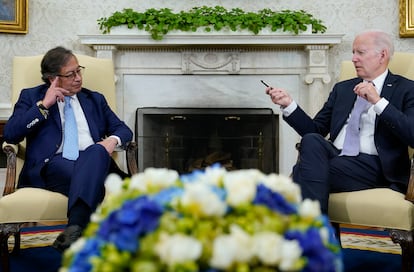Biden hosts Colombian President Gustavo Petro in the Oval Office: ‘Colombia is the key to the hemisphere’
The former guerilla met with the U.S. president to discuss the war on drugs, conserving the Amazon and the situation in Venezuela


U.S. President Joe Biden hosted his Colombian counterpart, Gustavo Petro, in the Oval Office on Thursday. The two seemed relaxed, sitting comfortably on two beige sofas. Behind them were portraits of Abraham Lincoln and Theodore Roosevelt and a bust of Martin Luther King.
“By the way, Happy Birthday,” Biden began, recalling that it was the Colombian president’s birthday the day before.
“They say that, in this generation, being 63 is like being 40 in the old generation,” Petro joked.
The two leaders laughed, and then spoke for 10 minutes in front of the press. It was the first time that Petro, a former anti-imperialist guerrilla who has constantly criticized the wars in Iraq and Afghanistan, had stepped inside the White House. He had traveled to the United States to call on Biden to change his government’s approach to the war on drugs, arguing that the focus should be on helping farmers and coca leaf producers find legal alternatives to the drug trade — not on eradicating coca fields which strips them of their livelihood.
But it’s a thorny issue for Washington. Biden told Petro that the two nations are making joint efforts to combat drug trafficking, but at no time did he refer to any change in approach. Petro was then practical and asked for more boats, drones and vessels. He spoke with the conviction of someone who has become one of the most important leaders in Latin America, especially after his visit to the United States.
In his address to the press, Biden said that Colombia was “the key to the hemisphere.” “I think we have an opportunity, if we work at it hard enough, to have a Western Hemisphere that is united, equal, democratic and economically prosperous,” he added.
Together with Colombia, we're tackling climate change, strengthening our economies, and combating drug trafficking.
— President Biden (@POTUS) April 20, 2023
As we begin the next century of our partnership, I'm eager to deepen and develop our cooperation.
Petro replied that the hemisphere was “well accustomed to peace and not war,” arguing that democracy in the region has deepened in recent decades.
The meeting comes eight months after Petro was elected president. During the visit, the two leaders agreed on the need to end dependence on fossil fuels and to protect the Amazon rainforest. Petro has proposed a new alliance of countries to support the Amazon Fund, which is aimed at protecting the rainforest from deforestation. Colombia has earmarked $150 million for the fund, while Biden pledged to invest $500 million. Biden also supported Petro’s idea for a debt-for-nature swap. The proposal is to cancel the foreign debt of the nine countries that make up the Amazon in exchange for a commitment to protect the rainforest. This would also be a way of relieving countries in financial trouble.
Before the White House meeting, Petro visited Stanford University and the U.N. General Assembly, where he also talked about the importance of tackling climate change. In his talks with Biden, he again stressed the need to transition to green energy — an idea the U.S. president supported. “I honestly believe we’re making some real progress moving toward a carbon-free environment,” said Biden.
During Thursday’s meeting, Biden and Petro also discussed the situation in Venezuela, which is of great concern to both. The Colombian president is trying to unblock negotiations between the Nicolás Maduro government and the opposition, and has organized an international meeting of foreign ministers in Bogotá to discuss the matter. Petro has also asked Biden to lift the economic sanctions on the Maduro administration, which the Venezuelan leader has set as a requisite for resuming talks with the opposition. But the White House mistrusts the Chavista government, which it accuses of failing to take any action to democratize the country’s institutions.
— Gustavo Petro (@petrogustavo) April 20, 2023
In the end, Petro agreed that sanctions should be lifted after free elections are held in Venezuela. This was the first time that Petro has made such a demand, as he has typically been more inclined to side with Maduro. The Colombian president has sought to break Venezuela’s international isolation, while insisting the country comply with democratic standards. Petro told reporters after the meeting he advocated for “a gradual and progressive deactivation of sanctions” that would allow Venezuelans “to decide freely, without sanctions, without pressure, their own destiny.”
After the press briefing, Biden and Petro talked for an hour in private. Petro was accompanied by the ministers for foreign affairs, justice and defense, as well as the presidential chief of staff and Colombia’s ambassador to Washington. Biden was joined by Secretary of State Antony Blinken, among others.
The issue of the electrical interconnection in the Americas was on the table. While grids are connected in Canada, the United States, Mexico and Central America, “between Panama and Colombia there is no connection,” said Petro. “If it is filled with clean energy, it would be one of the most helpful factors in decarbonizing the U.S. economy,” he added.
During Thursday’s meeting, Biden described Petro as a man of peace and recognized his fight for human rights. The Colombian president wants to go down in history as the man who brought peace to the country after decades of internal fighting. And he knows that he needs the U.S. on his side to achieve this ambitious goal.
Sign up for our weekly newsletter to get more English-language news coverage from EL PAÍS USA Edition
Tu suscripción se está usando en otro dispositivo
¿Quieres añadir otro usuario a tu suscripción?
Si continúas leyendo en este dispositivo, no se podrá leer en el otro.
FlechaTu suscripción se está usando en otro dispositivo y solo puedes acceder a EL PAÍS desde un dispositivo a la vez.
Si quieres compartir tu cuenta, cambia tu suscripción a la modalidad Premium, así podrás añadir otro usuario. Cada uno accederá con su propia cuenta de email, lo que os permitirá personalizar vuestra experiencia en EL PAÍS.
¿Tienes una suscripción de empresa? Accede aquí para contratar más cuentas.
En el caso de no saber quién está usando tu cuenta, te recomendamos cambiar tu contraseña aquí.
Si decides continuar compartiendo tu cuenta, este mensaje se mostrará en tu dispositivo y en el de la otra persona que está usando tu cuenta de forma indefinida, afectando a tu experiencia de lectura. Puedes consultar aquí los términos y condiciones de la suscripción digital.








































